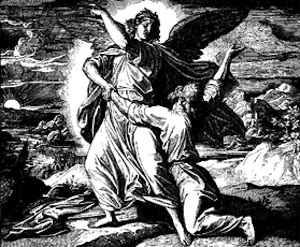Thoughts on Today’s Lessons for Sunday, Oct. 20, 2013.
Jeremiah pauses in his nearly relentless lamentation over the sins of Israel and Judah to offer words of hope and the certainty of God’s ultimate love. In the metaphor of sour grapes he reassures us that children will not be punished for the sins of their parents. Then, in words that Jeremiah understood as the restoration of the temple and Israel’s kingdom but that Christians may also interpret as foreshadowing Jesus, he prophesies a new covenant in which everyone will know God and all our sins will be forgiven.
Psalm: Psalm 119:97-104
The Psalmist exults in the study and understanding of God’s law, declaring the joy of unity with God through studious meditation and prayer. Let’s think of this song of praise in the context of today’s First Reading, in which Jeremiah understands God’s law as central to God’s new covenant: “I will put my law within them, and I will write it on their hearts; and I will be their God, and they shall be my people.” Surely these words were sweeter than honey to a people in exile, longing for their home.
First Reading: (Track Two) Genesis 32:22-31
Jacob wrestles all night with an angel who turns out to be God! Jacob, remember, the grandson of Abraham, son of Isaac, and father to Joseph, is a key figure in the first testament’s Ancestral Legends. Perhaps the lesson in this strange story is about persistence, as Jacob won’t surrender to this powerful stranger who injures his hip but can’t take him down: Stay the course, even when it’s hard, and you may earn God’s blessing.
Psalm: (Track Two) Psalm 121
One of the traditional “songs of ascents” thought to have been sung by worshippers as they processed toward the Temple in Jerusalem, this “Assurance of God’s Protection” is one of the Psalms’ most comforting hymns of hope and trust. Always awake, always watchful, God protects us by day and night, watching us come and go, keeping us safe today and forever.
Second Reading: 2 Timothy 3:14 – 4:5
Does this lesson call us to be bible-thumpers, lecturing unbelievers and rebuking them if they won’t listen? Probably not. This late New Testament document was written when the young church was fighting persecution. Know your scriptures, the writer advises the troubled flock. Even if it’s hard, even if you have to suffer, spread the good news. This message, written for a particular time and place, sounds different in modern America, when Christians hold the majority and wield power. Of course we are still called to spread the good news! But let it be the Gospel that Jesus taught us: Love God. Love our neighbors. Let the oppressed go free, and bring good news to the poor.
Gospel: Luke 18:1-8
In the patriarchal world of the ancient Near East, widows were helpless, vulnerable and weak. This widow in Jesus’s parable, though, is tough. She won’t quit pounding the corrupt and shiftless judge with her demands until he finally gives her the justice that she seeks. At first glance, we might wonder why Jesus is comparing God to a sleazy judge who won’t do his job. But Jesus makes a better point: Pray day and night, and God will listen and quickly respond.

